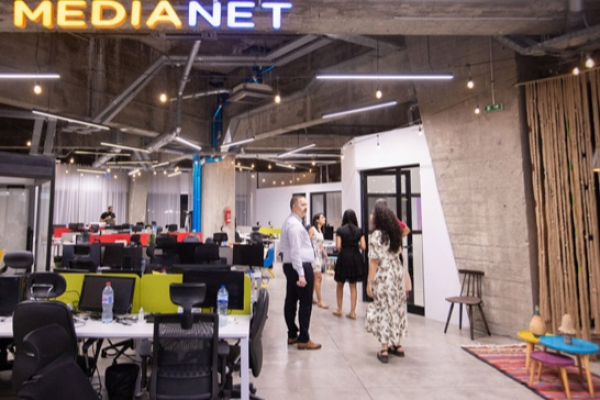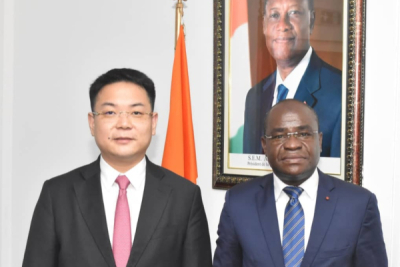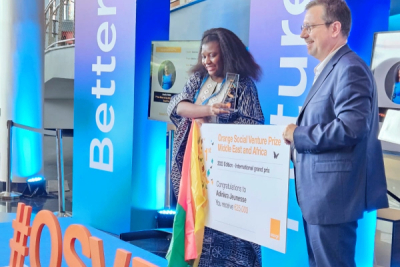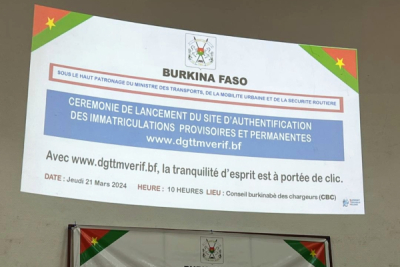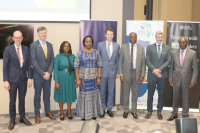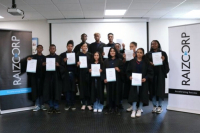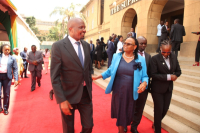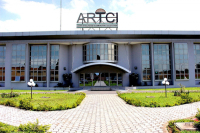MEDIANET has become a key player in digital innovation, supporting projects worldwide since its founding. The company operates on multiple continents.
MEDIANET, a Tunisian technology incubator established in 1998, aids entrepreneurs in transforming innovative ideas into thriving businesses. By creating that incubator, the founders, Iheb Béji, Akram Beji, Nidhal Battikh, and Mohamed Mellouki, aim to foster an ecosystem that encourages and enhances innovation and technological transformation.
With over two decades of experience, MEDIANET equips entrepreneurs with the expertise of its technical and business professionals and collaboration opportunities. The MEDIANET Incubator Space provides a workspace dedicated to fostering entrepreneurship and intrapreneurship, thereby enhancing the ecosystem of emerging startups.
FoodStart, MEDIANET’s premier incubation program, offers a customized, personalized program that equips foodtech entrepreneurs with technological proficiency and business acumen. The program aims to establish innovative foodtech firms, bolster the foodtech ecosystem in Tunisia, facilitate access to finance, and foster synergies between startups, SMEs, and large corporations.
In addition to being an incubator, MEDIANET specializes in digital transformation. With a presence in 30 countries worldwide, it provides a broad spectrum of digital services to businesses, including web and mobile development services and an e-commerce platform that simplifies the shopping experience.
The incubator also provides community management and SEO services, implements digital strategies for businesses, and assists business leaders in enhancing their performance and maximizing their return on investment through a media buying strategy.
To date, MEDIANET has successfully executed more than 2,900 projects across various sectors and has satisfied 1,000 customers globally.
Melchior Koba
A climate tech entrepreneur, she offers ecological and sustainable solutions to the Tunisian population through her company MonSapo.
Sabrine Chennaoui (photo), a Tunisian entrepreneur and co-founder and CEO of MonSapo, is at the forefront of green technology solutions. Her startup, MonSapo, established in 2021, is disrupting the green cleaning industry with its innovative, automated, and remote-controlled machine that recycles waste like used cooking oil and wood ash into natural cleaning products.
“MonSapo distinguishes itself by converting used vegetable oil and wood ash into detergent products, a unique innovation in the Tunisian market,” says Chennaoui. “Our research and development department is committed to continually providing our valued customers with premium products at always reasonable prices.”
On March 19, 2024, MonSapo was selected by the Techstars Sustainability Paris team to participate in its acceleration program, culminating in a demonstration day on June 6.
Chennaoui, a 2015 graduate of the Mediterranean School of Business in Tunisia with a master’s degree in business administration and management, participated in the Leading with Impact in Times of Change program at INSEAD business school in 2023.
Chennaoui’s professional journey began in 2010 as an intern at the Banque Nationale Agricole de Tunisie. She later served as a corporate marketing manager at Hashtag Agency in 2015, head of the marketing department at Hotel Africa Jade Thalasso in Tunisia in 2018, and a junior expert for the Tunisian Ministry of Higher Education and Scientific Research in 2020.
In 2022, the International Union for Conservation of Nature recognized Chennaoui as one of 20 young change agents. The following year, InspiringFifty named her one of the 50 most inspiring women in technology worldwide.
Melchior Koba
Côte d’Ivoire and China, maintaining a robust bilateral relationship spanning four decades across multiple sectors, have recently chosen to enhance their collaboration in the digital sector.
Chinese tech giant Huawei has pledged to continue its support for Côte d’Ivoire’s digital initiatives. Terry He (photo, left), President of Huawei’s Africa zone, reiterated this commitment during a meeting with Kalil Konaté (photo, right), the Minister for Digital Transition and Digitalisation, and his team in Abidjan on Thursday, March 21.
As per a press release from the ministry overseeing digital affairs, the initiatives include AI and digital technology training for the youth, the construction of digital libraries on a 36-hectare site to accommodate individuals recently relocated from high-risk areas, and the modernization of the Ivorian postal service.
Huawei’s renewed commitment to Côte d’Ivoire is an extension of the tech company’s ongoing efforts in the country. A partnership was established four years ago, in which Huawei agreed to bolster the development of Côte d’Ivoire’s ICT industry and assist in formulating its national digital economy development strategy, “Côte d’Ivoire Numérique 2030”.
The intensification of this collaboration, which has already yielded positive results, is expected to unlock new technological prospects for Côte d’Ivoire, particularly in the areas of rural connectivity, digital infrastructure, and digital inclusion projects. The ultimate goal is to position Côte d’Ivoire as a digital hub in the sub-region.
Samira Njoya
Orange Social Venture Prize in Africa and the Middle East was launched in 2011 by telecom operator Orange. It supports digital entrepreneurs and startups in 17 countries in Africa and the Middle East.
Orange Africa and Middle East has announced the launch of the 14th edition of the Orange Social Venture Prize in Africa and the Middle East (POESAM), according to a press release issued on Thursday, March 21. The competition, which is open for applications until May 26, aims to recognize the best technological projects with a social impact across the 17 countries where Orange operates.
POESAM is conducted in two phases: a national phase and an international phase. In the initial phase, three start-ups are awarded, and a prize for women’s entrepreneurship is given to the top digital project led by a woman. In the international phase, the three winners from each country compete before an international jury, led by Cheikh Tidiane Mbaye.
In a June 2023 interview with We Are Tech Africa, Mbaye discussed POESAM’s impact on technological innovation in Africa, stating, “The prize aids numerous entrepreneurs and startups. It’s not just the POESAM winners that benefit, it stimulates emulation by encouraging a large number of young Africans to take risks. Every Orange company in each of the 17 countries contributes to fostering this innovation and emulation.”
The 13th POESAM’s international grand prize was awarded to Cameroonian start-up Adinkra Jeunesse, which received a cheque for €25,000. The runners-up were Egrobots from Egypt (€15,000) and Smart WTI from Jordan (€10,000). The women’s prize was awarded to Tunisian start-up Bionic Soul. Additionally, the jury’s “Coup de Coeur” prize was given to the Cameroonian startup Services for Aged.
Adoni Conrad Quenum
Togo's capital, Lomé, is set to host Artificial Intelligence Week (AIW) from June 4 to June 8, an event that aims to unite tech enthusiasts, innovators, and thought leaders. The conference themed "L’IA au Togo et en Afrique : état des lieux, opportunités et enjeux sociétaux (AI in Togo and Africa: Current Status, Opportunities, and Societal Challenges)," seeks to foster sharing, learning, and shaping the future of AI.
In recent years, Burkina Faso embarked on a process to clean up its transport sector. The aim is to safeguard government revenue.
The Republic of Burkina Faso launched a platform for authenticating provisional and permanent vehicle registrations on Thursday, piloted by the Ministry of Transport, Urban Mobility and Road Safety. The platform, accessible at www.dgttmverif.bf, is expected to reduce fraud and counterfeiting significantly, according to Roland Somda, Burkina Faso’s Minister of Transport.
The digital tool, open to the public, will allow citizens to ensure their compliance with the law by identifying plates of poor physical quality, false number plates, or plates fitted with false registration documents.
This initiative is a continuation of the 2018 Project to modernize and secure transport permits and re-register vehicles in Burkina Faso. The project’s goal, as stated by the ministry, is “to establish a modern, secure system for producing driving licenses and vehicle registration documents following international standards and in secure ID card format, and to re-register vehicles in Burkina Faso’s fleet.”
The ministry plans to launch a campaign to raise awareness about the use of the new platform.
Melchior Koba
African nations are increasingly digitizing public services but the initiatives require significant resources. For that purpose, governments are partnering with strategic allies to overcome the significant costs associated with them.
Zambia’s government and Trade Mark Africa, a trade aid organization, inked an $11 million deal on Wednesday to digitize the Nakonde border post, a strategic crossing point with Tanzania and Malawi. The project, funded by the British government and the World Bank, is expected to be completed in twelve months.
The initiative aims to streamline control processes and cut the transit time for goods at the Nakonde border from an average of three days to just ten hours. It includes a broad spectrum of interventions such as infrastructure upgrades, modern scanning systems, digitization of customs clearance processes, and cross-border interconnectivity for information exchange.
According to Zambia’s Finance Minister, Situmbeko Musokotwane, the initiative encompasses a wide range of interventions, including infrastructure improvements, modern scanning systems, digitization of customs clearance processes, cross-border interconnectivity for information exchange, smart digital solutions, change management, and integrated border management.
Nakonde facilitates trade between Zambia, Tanzania, the Democratic Republic of Congo (DRC), and Zimbabwe. It generates around 3.1 billion kwachas ($118.5 million) annually, with 65% of goods transiting through Zambia, of which 35% are destined for the country led by Hakainde Hichilema.
Adoni Conrad Quenum
With its six divisions, Raizcorp works on a global scale to support the entrepreneurial ecosystem. To date, it has already supported 500 companies.
Raizcorp, a business incubator established in 2000, is dedicated to nurturing entrepreneurs at various stages of their business journey. Founded by CEO Allon Raiz, the organization serves as a hub for learning and guidance, facilitating tangible business success for entrepreneurs.
At the core of Raizcorp's mission is the creation, support, and development of entrepreneurs and the broader entrepreneurial ecosystem. By providing business incubation and acceleration services, the incubator aims to expedite the growth and prosperity of entrepreneurs. It also administers business and supplier development programs on behalf of companies.
Raizcorp extends equity investment opportunities to budding entrepreneurs, while also engaging in educational initiatives to foster entrepreneurial skills among school children. Moreover, the organization collaborates with governments and development agencies to establish robust entrepreneurial frameworks on a national scale.
It operates through six dedicated divisions. Notably, Arize, which offers dedicated support to entrepreneurs, and SEED, focusing on entrepreneurial development strategies in emerging markets like Africa and South America. The Partner Elite division provides scale-up capital to high-growth entrepreneurs in South Africa, while Canden manages non-traditional schools with an entrepreneurial curriculum.
Elixir, another division, assists companies in cultivating an entrepreneurial mindset and accessing relevant markets. It also aids entrepreneurial graduates in launching their own ventures. The Inspire division offers a range of motivational resources, such as books, inspiration packs, and posters, to support entrepreneurs on their journey.
To date, Raizcorp has empowered 500 businesses through its programs and oversees 13 incubators. Currently, 224 children are undergoing entrepreneurial training. The organization's impact extends across multiple countries, including South Africa, Tanzania, Uganda, Mozambique, Zimbabwe, Angola, the United States, France, and Mauritius.
Melchior Koba
Since President William Ruto assumed office in Kenya in September 2022, the pace of the country's digital transformation has accelerated, with the digitization of numerous public services now a reality.
Kenya is set to digitize its judicial services starting July 1, 2024. The announcement was made by Martha Koome (photo, center), the President of the Supreme Court, on Monday, March 11. The primary objective of this initiative is to enhance productivity, streamline processes through automation, and establish a paperless environment. These efforts aim to make justice more accessible in Kenya while reducing geographical barriers.
"I launched e-filing for all courts countrywide, a Data Tracking Dashboard and Causelist Portal marking a giant leap in our commitment to transforming how we deliver justice through the strategic use of technology, in alignment with the Social Transformation through Access to Justice (STAJ) blueprint of the Judiciary," stated Martha Koome.
Furthermore, Koome emphasized that starting from July 1, 2024, courts will no longer print pleadings and documents. The resources previously allocated for paper and ink will now be redirected towards acquiring desktops and laptops, along with training initiatives.
These initiatives are part of Kenya's National Digitisation Plan (2022-2032), which was established shortly after President William Ruto assumed office in September 2022. As Kenya strives to position itself as a key player in the technological landscape, the digitization process has gained momentum across various sectors. The country has secured funding from diverse organizations and entities such as the World Bank and the European Union to support its digital transformation endeavors.
It is worth noting that the digitization of judicial services commenced last year with the introduction of e-filing in Mombasa County in April 2023. "We are now reaching a national scale with court stations in the remaining 34 counties being on-boarded today. This marks a transformative step in making our justice system more efficient and accessible," explained Martha Koome.
Adoni Conrad Quenum
Côte d'Ivoire's Telecommunications/ICT Regulatory Authority (Artci) has issued a warning to US-based Starlink, prohibiting the satellite internet provider from operating in the country without due approval, according to a release issued on Tuesday. This follows last week's internet disruptions in several West and Central African nations, caused by damage to the WACS, MainOne, ACE, and SAT3 submarine cables.
More...
The e-health solution was established by a former banker, who ventured into entrepreneurship driven by her desire to transform telemedicine in Central Africa.
AfriWell Health, a Congolese healthtech startup, offers a platform for patients to connect with healthcare professionals for treatment. Founded in 2022 by Joelle Itoua Owona and based in Pointe-Noire, the startup secured an undisclosed funding from Google for Startups in March 2023 to bolster its growth.
The company’s solution, an Android-exclusive mobile application, allows users to register with their personal details and access a variety of healthtech services, including online appointments with general practitioners and specialists.
Since AfriWell Health has doctors worldwide, consultations are mainly carried out online. Owona’s goal with her healthtech solution is to address the doctor shortage in Africa, particularly in Congo. The platform maintains a digital medical record for each patient, providing doctors with a comprehensive view of their medical history.
The startup also facilitates healthcare provision for the Congolese diaspora to their relatives back home. Additionally, AfriWell Health provides a weekly updated list of on-duty pharmacies in Pointe-Noire, streamlining the medicine purchasing process for patients.
Adoni Conrad Quenum
The fintech sector in Africa is experiencing exponential growth, with South African entrepreneur Paul Kent as one of the actors leading the charge. His start-up, which offers a range of digital payment solutions, already caters to tens of thousands of customers across the continent.
Paul Kent (photo), co-founder and CEO of Adumo, is making waves in the fintech sector. A South African native, Kent completed a management development programme at the University of the Witwatersrand in 2003 and earned an MBA from Spain’s IE Business School in 2015.
His fintech, Adumo, is a growth partner for businesses. It offers a seamless and secure omnichannel approach to accepting various types of payment products. The company’s mission is to help entrepreneurs manage, grow, simplify, and optimize their businesses through superior payment experiences.
It provides several employee incentive solutions and a gift and loyalty platform to enhance customer engagement. Adumo has developed standalone payment card machines and offers access to various types of online and point-of-sale payments. Through Adumo Capital, it provides entrepreneurs with initial business funding.
Currently, Adumo serves over 70,000 active customers in 13 African countries, handling more than 80 billion rand, or over $4 billion, in annual transaction value.
Kent, a certified director of the Institute of Directors in South Africa, is also the founder and director of SureSwipe, a card payment services provider established in 2008. Since 2020, he has served as a director of the Innervation financial company PAN African Payment Solutions. His professional career began in 2001 as an account manager at Healthbridge, a healthcare payment solutions provider.
Melchior Koba
The solution was developed to help people get the best prices in online shops.
ComparoShop, a digital solution developed by a startup based in Douala, Cameroon, allows users to compare prices of a wide array of items online before making purchases from online stores. The startup, founded by Didier Tagne in 2022, employs artificial intelligence to enhance search results.
The platform, which does not offer a mobile application, can be accessed via a browser. Users are not required to create an account to access the platform’s information. By entering the product name in the search bar, users can view various suggestions. Based on their geographical location, they can find online stores selling the desired item, its prices, and customer reviews of the respective store. This enables users to compare prices, analyze reviews, and make informed decisions.
Purchases are made through the online stores linked to ComparoShop. Users select their preferred offer on ComparoShop and are redirected to an external site to complete the purchase by clicking on the “See offer” button. If the online store only has a social media page instead of a website, ComparoShop notifies the store to contact the user for delivery. Currently, the startup operates only in Cameroon and Algeria.
Adoni Conrad Quenum
As the tech landscape continues to evolve, entrepreneurship in new technologies is gaining prominence. Cyberschool Entrepreneuriat, based in Gabon, is positioning itself as a key player, spurring the youth to tap into the potential of Information and Communication Technologies (ICTs).
Cyberschool Entrepreneuriat, a Gabon-based incubator specializing in new information and communication technologies (NICTs), leverages these technologies to foster entrepreneurship and aid young individuals in bringing their projects to fruition. The incubator, established in 2010 by Mve Asseko Simplice, an IT project management master’s degree holder, runs several training and support programs to cultivate an entrepreneurial mindset among Gabon’s youth.
The incubator has initiated a two-week training seminar for project leaders and those seeking to enhance their skills, focusing on business plan creation. To further assist its entrepreneurs, Cyberschool Entrepreneuriat has developed Business Booster, an application designed for business plan creation and project monitoring.
It regularly hosts a digital lunch for IT professionals and organizes development workshops. These workshops offer training in computer programming, software development, and IT project management to young individuals and professionals. The workshops aim to equip participants with the necessary tools to stay abreast of the latest technologies and trends, preparing them to work in teams and tackle the challenges of the IT industry.
Additionally, Cyberschool Entrepreneuriat offers training in graphic design and visual communication. This course enables students to master graphic design tools and software, principles of visual composition, and typography. It equips them with robust technical skills for producing high-quality visual communication media, creating effective graphic designs tailored to customer needs, and fostering the creativity and artistic flair required to design innovative and original projects.
Melchior Koba


